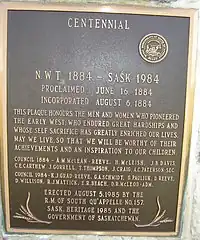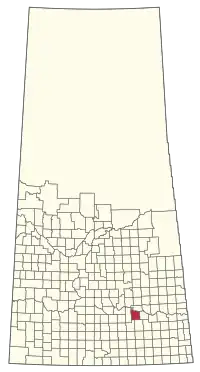South Qu'Appelle No. 157 | |
|---|---|
| Rural Municipality of South Qu'Appelle No. 157 | |
 RM's centennial plaque | |
 Location of the RM of South Qu'Appelle No. 157 in Saskatchewan | |
| Coordinates: 50°32′17″N 103°59′49″W / 50.538°N 103.997°W[1] | |
| Country | Canada |
| Province | Saskatchewan |
| Census division | 6 |
| SARM division | 1 |
| Formed[2] | August 6, 1884 |
| Government | |
| • Reeve | Jeannie DesRochers |
| • Governing body | RM of South Qu'Appelle No. 157 Council |
| • Administrator | Heidi Berlin |
| • Office location | Qu'Appelle |
| Area (2016)[4] | |
| • Land | 889.72 km2 (343.52 sq mi) |
| Population (2016)[4] | |
| • Total | 1,275 |
| • Density | 1.4/km2 (4/sq mi) |
| Time zone | CST |
| • Summer (DST) | CST |
| Area code(s) | 306 and 639 |
The Rural Municipality of South Qu'Appelle No. 157 (2016 population: 1,275) is a rural municipality (RM) in the Canadian province of Saskatchewan within Census Division No. 6 and SARM Division No. 1. It is located in the southeast portion of the province.
History
The RM of South Qu'Appelle No. 157 incorporated as a rural municipality on August 6, 1884.[2]
Geography
The burrowing owl (athene cunicularia), an endangered animal, makes its home in this area.[5]
Communities and localities
The following urban municipalities are surrounded by the RM.
- Villages
The following unincorporated communities are within the RM.
- Localities[7]
Demographics
In the 2021 Census of Population conducted by Statistics Canada, the RM of South Qu'Appelle No. 157 had a population of 1,231 living in 475 of its 515 total private dwellings, a change of -3.5% from its 2016 population of 1,275. With a land area of 877.75 km2 (338.90 sq mi), it had a population density of 1.4/km2 (3.6/sq mi) in 2021.[10]
In the 2016 Census of Population, the RM of South Qu'Appelle No. 157 recorded a population of 1,275 living in 489 of its 528 total private dwellings, a 0.3% change from its 2011 population of 1,271. With a land area of 889.72 km2 (343.52 sq mi), it had a population density of 1.4/km2 (3.7/sq mi) in 2016.[4]
Government
The RM of South Qu'Appelle No. 157 is governed by an elected municipal council and an appointed administrator that meets on the second Wednesday of every month.[3] The reeve of the RM is Jeannie DesRochers while its administrator is Heidi Berlin.[3] The RM's office is located in Qu'Appelle.[3]
See also
References
- ↑ "Pre-packaged CSV files - CGN, Canada/Province/Territory (cgn_sk_csv_eng.zip)". Government of Canada. July 24, 2019. Retrieved May 23, 2020.
- 1 2 "Rural Municipality Incorporations (Alphabetical)". Saskatchewan Ministry of Municipal Affairs. Archived from the original on April 21, 2011. Retrieved May 9, 2020.
- 1 2 3 4 "Municipality Details: RM of South Qu'Appelle No. 157". Government of Saskatchewan. Retrieved May 21, 2020.
- 1 2 3 "Population and dwelling counts, for Canada, provinces and territories, and census subdivisions (municipalities), 2016 and 2011 censuses – 100% data (Saskatchewan)". Statistics Canada. February 8, 2017. Retrieved May 1, 2020.
- ↑ "Saskatchewan Conservation Data Centre - Conservation Database". Saskatchewan Conservation Data Centre. 2007. Retrieved December 26, 2007.
- ↑ "2019-2020 Rural Revenue Sharing Organized Hamlet Grant". Government of Saskatchewan. Retrieved May 4, 2020.
- ↑ "4708001 - Swift Current No. 137, geographical codes and localities ,2006", Statistics Canada, Government of Canada, retrieved December 29, 2007
- ↑ "Saskatchewan Census Population" (PDF). Saskatchewan Bureau of Statistics. Archived from the original (PDF) on September 24, 2015. Retrieved May 9, 2020.
- ↑ "Saskatchewan Census Population". Saskatchewan Bureau of Statistics. Retrieved May 9, 2020.
- ↑ "Population and dwelling counts: Canada, provinces and territories, census divisions and census subdivisions (municipalities), Saskatchewan". Statistics Canada. February 9, 2022. Retrieved April 13, 2022.
